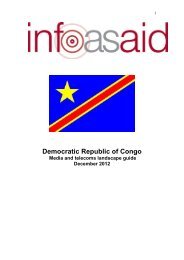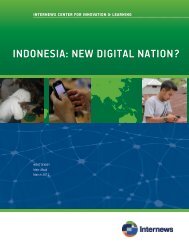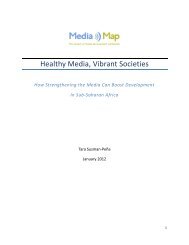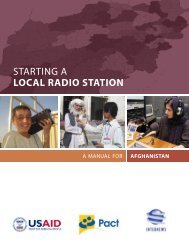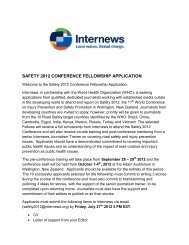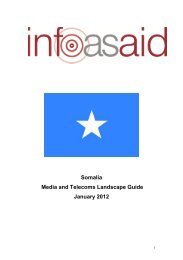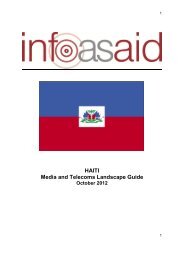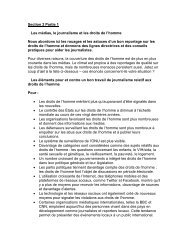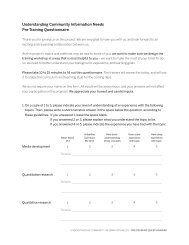Ethiopia Media and Telecoms Landscape Guide - Infoasaid
Ethiopia Media and Telecoms Landscape Guide - Infoasaid
Ethiopia Media and Telecoms Landscape Guide - Infoasaid
Create successful ePaper yourself
Turn your PDF publications into a flip-book with our unique Google optimized e-Paper software.
5During Mengistu’s 17-year rule, <strong>Ethiopia</strong> suffered from continuous political violenceas his Soviet-backed government sought to impose Marxist rule on the country.Rebel groups fighting against Mengistu’s rule in Eritrea <strong>and</strong> the northern province ofTigray steadily gained in strength during the 1980s.The impact of droughts <strong>and</strong> famines during Mengistu’s rule was aggravated by thisconflict. The fighting impeded humanitarian access to vast areas of the interior.Mengistu’s “villagisation” policy, which forced millions of peasants to move fromsmall outlying settlements into larger government-controlled villages, also causedgreat hardship.It is widely estimated that up to one million people died of hunger <strong>and</strong> relateddiseases during the 1984-85 famine in northern <strong>Ethiopia</strong>.Today, <strong>Ethiopia</strong> has a strong central government that allows for some localautonomy in several ethnically-based administrative regions.The government maintains tight control over the media <strong>and</strong> a state monopoly ontelecommunications services.The ruling EPRDF began life as an armed rebel movement based in the northernprovince of Tigray.After fighting its way to power in 1991, the EPRDF transformed itself into nationalpolitical party.It has allowed the emergence of a multi-party system <strong>and</strong> has granted a measure ofautonomy to the main tribal areas.However, most local administrators are stalwarts of the ruling party <strong>and</strong> their loyaltyto central government gives the federal authorities in Addis Ababa a strong h<strong>and</strong>throughout the nation.The government holds regular elections. However, after 20 years in power, theEPRDF remains the dominant political force in the country.Opposition parties complain that they have been marginalised by the EPRDF’s tightcontrol of radio <strong>and</strong> television, the persecution of opposition activists <strong>and</strong> electionrigging.According to the official results of the May 2010 general elections, the EPRDF won499 of the 547 seats in parliament.Parties allied to the EPRDF won a further 44 seats. Genuine opposition c<strong>and</strong>idateswon just two.



